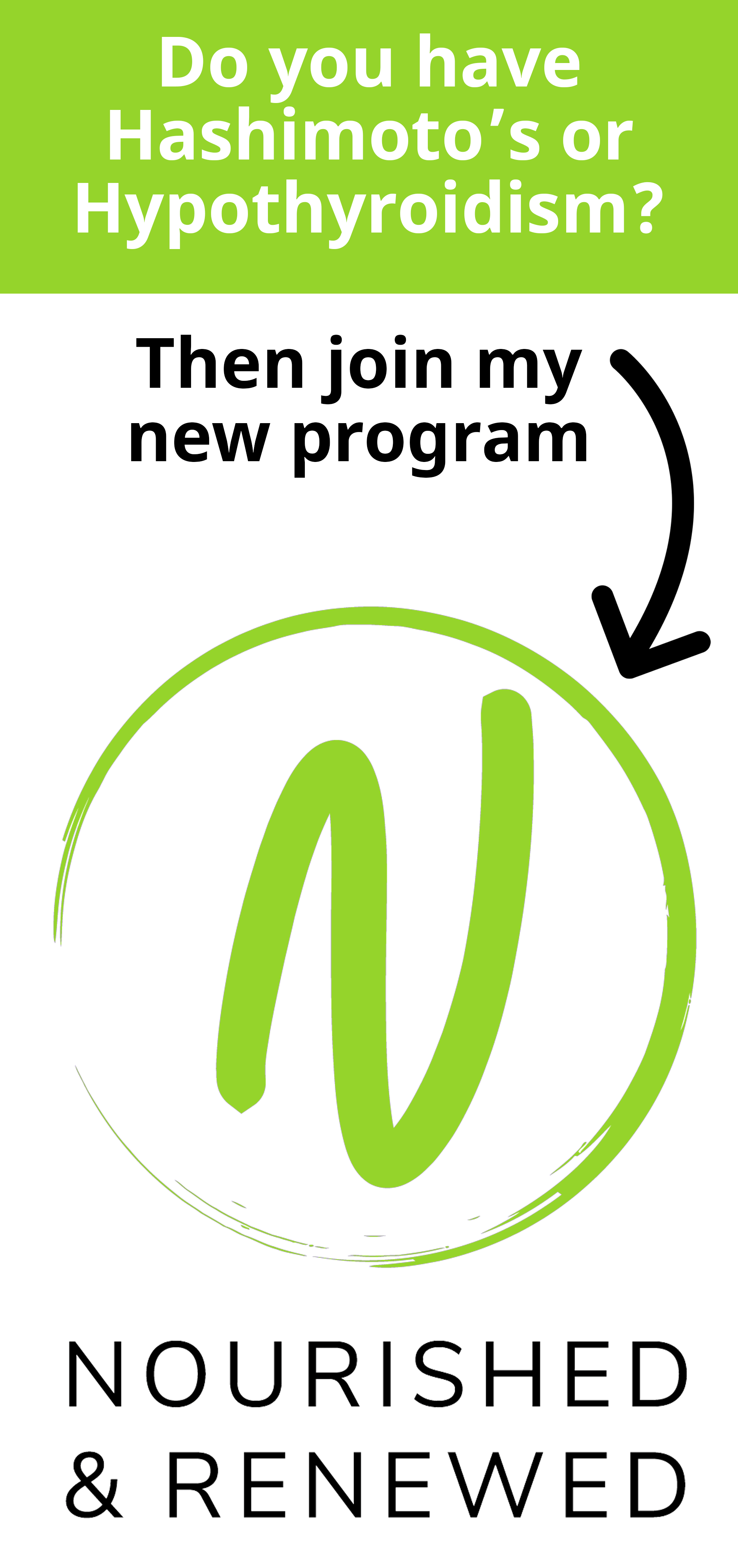Meet Annaleese, A Typical Hashimoto’s Mom
Her weight had shot up about 20 pounds seemingly overnight.
Stressed out, tired.
Running from place to place for her kids, job, extended family and as an active volunteer in her community, Annaleese is pretty much like 99% of the women I work with.
Diagnosed with Hashimoto’s in her mid-20s, Annaleese was now 43 and feeling a surge of returning hypothyroid symptoms.
Annaleese was anxious.
She came to me for help.
What she had been doing WAS NOT WORKING.
Despite her other annoying hypothyroid symptoms (feeling cold, tired, dry skin and losing some scalp hair, having trouble sleeping), the weight gain was the most troublesome.
She had recently joined a crossfit gym, was eating a primarily Vegan diet, and took a slew of vitamins from the shelves at Whole Foods, GNC, Costco and Target.
Annaleese was doing everything she could.
Except for resting or truly taking care of herself.
First Things First For A Hashimoto's Person
A Mental Turning Point To Better Manage Your Hashimoto's symptoms
I have shared with many Hashimoto’s clients that eating only for the sake of losing weight and looking a certain way is never going to actually make you healthy.
We must accept that if we are going to manage our Hashimoto’s, and our general health, we have to stop the obsession with our weight.
This is a tough pill to swallow.
However, necessary to healing your thyroid and body… AND to stop feeling terrible… is to be okay with our bodies regardless of size, shape or overall muscle tone.
Love Yourself
“Self-love” might seem like a joke to some.
Is self-love something that sounds nice but isn’t actually achievable?
I know, I know.
But, I promise, loving yourself regardless of size can be vital to your healing journey. Loving your body must take priority over hating your body.
Your cells are listening.
Have Hashimoto's? Stop Trying So Hard To Lose Weight
Judging by what society tells us about weight loss, NO PAIN NO GAIN.
You might be afraid that if you stop trying so hard, you will gain 20 more pounds?!
Here’s what I have found personally, as well as heard from many of my Hashimoto’s clients.
Doing less to achieve an “ideal” weight ultimately results in:
- reduced overall hypothyroid symptoms
- improved sustained energy
- stabilized blood sugar, less shakiness and irritability
- ultimately lowered total body weight
But, hey! None of this happens overnight.
It takes time! That is one concept that I know is extremely hard to grasp.
We all want a little immediate gratification now and then.
But, at the end of the day, the journey is worth it, and the freedom in letting go of constantly trying to lose weight is truly liberating.
Start on a New Weight Loss Thyroid-Friendly Agenda
Rest: The Number One Remedy for Weight Loss
Our bodies have this amazing capability to heal.
When you’re in the “rest and digest” stage, or in an anabolic process, your body is actively repairing and healing itself.
This happens at night while we sleep.
When you are under constant daytime stress, your body goes into “fight or flight response” mode, diverting its attention from healing and digestion and goes into emergency mode!
Under stress, you’re pumping your body full of adrenaline to prepare it to survive what your body perceives to be a life-threatening event.
Insufficient sleep could likely cause weight gain and impede weight loss plan
People who are sleep- or rest-deprived tend to weigh more and have more trouble losing weight than those who get adequate rest, even when they follow the same food plan.
When you don’t get enough sleep, your body over produces the hunger-causing hormones leptin and ghrelin.
You could be more susceptible to overeating, while at the same time being less satisfied afterward.
People who consistently get less than six hours of sleep also show glucose and insulin levels and characteristics similar to diabetics, even if they are otherwise very healthy.
Your fat cells lose their ability to properly use insulin.
As your body becomes more resistant to insulin, it will produce more and more in order to function.
This leads to fat buildup and could eventually lead to diabetes.
Not getting enough sleep also makes you more stressed out, which in turn makes it more difficult for you to control your appetite.
A sleep-deprived body will produce more of the stress hormone cortisol.
Cortisol triggers the reward center in your brain and makes you crave food - especially sugar.
The combination of more cortisol and more ghrelin mean that you’ll need to eat more food than you normally would in order to feel satisfied.
Lack of sleep can also lead you to have intense cravings and make it less likely to be able to say no to unhealthy treats.
Exhaustion reduces your mental clarity and judgment. Duh!
You’re more likely to reach for that donut in the office when you’d normally choose a piece of fruit.
Food: For Healing, Not For Weight Loss
When you look beyond the magazines and commercials telling us that x, y and z will make us skinny, a new world of healthful opportunity opens up.
Yay! Let’s begin using food to heal.
A Standard American Diet (SAD) is made up of too much sugar and tons of processed carbs!
Most Americans rarely eat a whole-food nutrient dense diet.
But, a food plan that is completely UN-MESSED-AROUND-WITH is the one that makes all the difference.
Start Here:
- many local vegetables, fruits in moderation
- local, pasture-raised meats
- wild-caught fish
- good quality plant-based fats
- whole grains and legumes if they work for your digestive system
- nuts and seeds (preferably soaked and sprouted)
The nutrients in real food like bone broth, greens, sardines, sauerkraut and even organic chicken or beef liver give your body the real food nutrition that it needs to function properly.
Our cells need proper nutrients to heal and for our bodies to thrive.
"Diet food," low-calorie food and processed/packaged foods (even if they say otherwise on the package) WILL NOT give your body what it intuitively needs to heal.
Here’s something else: don’t eat low carb, don’t avoid fat, and generally try not to know how many calories you eat or need to eat.
Trying too hard with food is counter-intuitive to the process of healing.

No one size fits all diet for Hashimoto’s
There is no specific diet proven to help everyone with Hashimoto's.
An individualized approach to nutrition is necessary.
Some clinical evidence has shown that the following food plans have helped some people with Hashimoto's:
- gluten-free
- sugar-free
- Paleo
- grain-free
- dairy-free
- autoimmune paleo
- low glycemic or Mediterranean
What you choose is not as important as listening to your body and paying attention to how you feel when you eat.
Food should nourish, nurture, satiate and satisfy. It can be enjoyed healthfully among loved ones.
It is neither “Good” nor “Bad.” Food gives our bodies fuel.
In turn, how our bodies respond (positively or negatively) gives us information about what we will choose again in the future.
And, perfection with food is more folly.
My rule: 80% of the time I am eating exactly the way I should for a healthy body/mind/spirit. 20% of the time I am eating ... well, because ... life happens.
Maybe I just didn't have as much time to plan meals in a given week. Or I was on vacation. Or it's someone's birthday and I want to partake in a piece of (gluten free) cake. Or because I was simply in the mood for some French fries. Ya know?!
It's called "life."
And with the 80/20 rule, there is room for life. Joyous life!
Exercise For Hashimoto’s: Avoid Killing Yourself
Do you love the adrenaline rush that a spinning class gives you?! I know I used to LOVE IT.
Consider this: how much better would you feel without that intense adrenaline and cortisol spike on a regular basis?
Tearing your body down with high intensity exercise is probably spiking your cortisol. It might also be throwing off the delicate balance of your hormones (including thyroid) even further.
Annaleese confessed to me that CrossFit would exhaust her to the point of wanting to pass out.
Though CrossFit is known as a supportive environment (which it totally can be in many cases), it isn’t doing anyone any good to have someone pushing you to go harder and harder when you just physically CANNOT.
Spoiler alert: overly intense exercise will throw off your weight loss efforts even more.
Opting instead for a routine with lots of walking, light weight lifting, and yoga is a credible, healthful, and regenerative exercise program for a Hashimoto’s person.

Listen to your body to determine the best amount of exercise
For me, I’ve quit the expectation of how much I’m going to work-out in a week, and only push myself as far as I can reasonably go.
And, that changes week by week, day by day, sometimes hour by hour. I have to listen to – and trust – my body to help me make the best decision.
If you are exercising, and you find that you feel exhausted after the exercise, this generally means that what you just did was too much for you.
A good amount of exercise should make you feel refreshed and energized.
You should feel like you should be able to do it all over again once more.
Again, it’s important to find the appropriate amount of exercise and tailor your needs to your own body.
Whatever you choose to do, make sure you are enjoying it. Exercise should bring joy and pleasure. Not suffering or pain.
Stress could worsen Hashimoto's Symptoms: Combat Your Monsters
We all know that trying to lose weight is stressful mentally, emotionally, and physically.
Managing stress is often one of the missing pieces in reversing most autoimmune disease and one treatment option that can’t be measured by a blood test.

Stress is relative.
Everyone handles it differently in their day-to-day life. And, people have different thresholds for how much and often they can tolerate different stressors.
One thing is for sure: constant attempts to lose weight is a stressor on the physical body, regardless of who you are.
Treat your body with love and kindness. Oops, I already said that!
But, hear me out.
Don't put yourself through the constant stress of forcing your body to be “smaller, skinnier, fitter, leaner, meaner, etc.”
Lowering stress on your physical self may better allow you to reduce your antithyroid antibodies and reach overall better health.
As a result of supporting your thyroid, symptoms will dwindle, and even those who once had a lot of extra weight to lose suddenly do not anymore.
Stress is a very challenging thing to get a handle on.
I have a quick video you can watch about Self Care Practices for Those With Hashimoto’s. Check it out.
Thyroid Medicine: Maximize Its Potential To Support Weight Loss
If you are taking thyroid hormone replacement medication and you have concerns about your weight, there are some important factors to understand about its impact on your thyroid and metabolism.
Although taking levothyroxine medication restores normal T4 levels, it does not restore your basal metabolic rate (BMR) to it’s normal levels.
Metabolism remains 10- 20% less efficient, which may be at the root cause of your ability to achieve or maintain a healthy weight.
Levothyroxine, a medication that contains the T4 hormone, is the most commonly prescribed medication for an underactive thyroid.
However, the T3 thyroid hormone is more effective for maintaining our metabolism.
In theory and on paper, T4 gets converted into T3. However, there are many potential factors (including genetics!) that can prevent this conversion from happening in the human body!
Factors that Inhibit T4 to T3 Conversion
- Stress
- Medications including Chemotherapy
- Aging
- Surgery
- Nutrient Depletions
- Fasting or Restrictive Dieting
- Diabetes or Blood Sugar Dysregulation
- Soy foods
- Obesity
- Goitrogenic Foods, such as Broccoli
- Pesticides on Conventional Produce
- Having Low Progesterone
- Too Much Iodine
- Heavy Metal Exposure or Toxicity
- Cigarettes and Second-Hand Smoke
- Kidney and Liver Disease
- Drinking alcohol blocks thyroid function, blocks both fT4 and fT3, and increases rT3
Supplements To Naturally Boost Your T3 Levels
- Zinc - Zinc helps convert T4 to T3. Zinc is also a powerful anti-inflammatory agent and it may help regulate the immune system.
- Selenium - Selenium helps convert T4 to T3. It can also help balance the immune system and has been shown to be effective in helping reduce antibody levels in Hashimoto's.
- Vitamin B6 - Vitamin B6 helps support thyroid function and it also helps create and maintain neurotransmitters in the brain. In addition, it's required for normal and healthy brain development.
Articles Referencing Lifestyle Measures to Positively Boost Your T3 Levels
- Heal your digestive system.
- Manage your stress and support your adrenal glands.
- Balance your reproductive hormones.
- Get sugar intake under control.
Probiotics: Bacteria Can Help Control Weight
New research is showing that people who are overweight have an imbalance of bacterial flora in their intestines.
Those who are overweight may have particular bacteria strains that extract more calories from food compared to those found in people who are not overweight.
This means you could be eating the same amount of food as your friends yet gaining more weight from it!
Probiotics and fermented foods that contain beneficial bacteria may be helpful with balancing your bacterial flora.
As a bonus, since 70 percent of your immune system resides in the cell walls of your digestive system, supporting your gut health will also help support your immune system.
What You Need to Know About Probiotics
Only a few have the ability to make it through the stomach acid, the liver’s bile secretions and the pancreatic enzymes without being destroyed.
There is a distinction between transient and colonizing probiotics.
Most probiotic supplements on the market today are transient probiotics. This means they transit through the gut but do not make a permanent or lasting change to the microbiome.
They can make you feel better, but once you stop taking them, the microbiome generally returns to its original state before probiotic use.
Colonizing probiotics actually adhere to the gut wall, become permanent residents, and build microbial diversity.
One microbe that has been shown to adhere to the gut wall and able to survive transit through the human gastrointestinal tract is called Bifidobacterium lactis (HN019).
This probiotic strain can also increase the populations of other good bacteria in the gut such as bifidobacteria and lactobacilli.
Another probiotic that is able to safely transit the gastrointestinal tract and adhere to the gut wall is Lactobacillus plantarum. It is found commonly in fermented foods like sauerkraut and fermented olives.
Fermented Food Options:
- kimchi
- fermented olives or pickles
- kefir
- kombucha
- miso
- tempeh
- raw cheese
- yogurt
Adding just a small amount of fermented foods daily can help resolve your gut issues and normalize your microbiome.
Customized Supplementation For Weight Loss (especially if you have Hashimoto's!)
One of the surprising reasons why people hold onto excess weight is because they are malnourished.
It may seem counter intuitive that a person who is overweight would be nutrient deficient or malnourished.
However, our nutritional status isn’t based on just calories alone.
The human body requires macro and micro-nutrients to thrive, and proper nutrient status depends on our intake of nutrients, digestion of food, and absorption of the nutrients from the food.
Without these nutrients, your body may sabotage your weight loss efforts by slowing down your metabolism. It may also cause you to have cravings or feel hungry, even when you have had enough to eat.
I use Spectracell micronutrient testing in my office to help me understand your specific nutrient deficiencies and how it may be contributing to your thyroid, overall health and weight goals.
Here is a general list of various nutrients that are related to healthy weight management:
- Zinc - reduces leptin, a beneficial hormone that regulates appetite, which is reversed by zinc repletion.
- Asparagine - this amino acid increases insulin sensitivity which helps the body store energy in muscle instead of storing it as body fat.
- Biotin - boosts metabolism by improving glycemic control (stabilizes blood sugar) and lowers insulin, a hormone that promotes fat formation.
- Carnitine - carries fatty acids into cell so they can be burned for fuel; Helps reduce visceral adiposity (belly fat).
- Calcium - inhibits the formation of fat cells; helps oxidize (burn) fat cells.
- Lipoic Acid - improves glucose uptake into cells, which helps burn carbohydrates more efficiently.
- Chromium - makes the body more sensitive to insulin, helping to reduce body fat and increase lean muscle.
- Vitamin B5 (pantothenate) - lowers body weight by activating lipoprotein lipase, an enzyme that burns fat cells. One study linked B5 supplementation to less hunger when dieting.
- Magnesium - low magnesium impairs a person’s ability to use glucose for fuel, instead storing it as fat. Correcting this deficiency stimulates metabolism by increasing insulin sensitivity. Magnesium may also inhibit fat absorption.
- Glutamine - reduces fat mass by improving glucose uptake into muscle.
- Cysteine - this antioxidant reduced body fat in obese patients.
- Inositol - may increase adiponectin levels.
- Vitamin B3 (niacin) - treatment increases adiponectin, a weight-loss hormone secreted by fat cells and Niacin-bound chromium supplements helped reduced body weight in clinical trials.
- Vitamin A - enhances expression of genes that reduce a person’s tendency to store food as fat and reduces the size of fat cells.
- Vitamin E - inhibits pre-fat cells from changing into mature fat cells, thus reducing body fat.
- Vitamin D - deficiency strongly linked to poor carbohydrates metabolism; Genes regulated by vitamin D may alter the way fat cells form in some people.
- Vitamin K - poor vitamin K status is linked to excess fat tissue; helps metabolize sugars.
Knowing the Numbers For A Healthy Hashimoto's Weight Loss Plan
As you can see, proper nutrition both from food and supplements, is a critical component to your body being able to be both healthy inside and out.
And using the bioimpedance analysis test to measure the progress of a healthy weight loss plan brings you further.
I learned about bioimpedance analysis and its positive empowering impact on a person’s understanding of their health many years ago.
Originally designed for sports nutrition, its other clinical uses include healthy aging and body composition for weight loss.
I offer bioimpedance analysis in my office for clients who are interested in knowing their numbers that might help them achieve not only weight loss – but better overall health.
There are basically two main numbers which help you understand better about your body’s ability to lose weight.

Basal Metabolic Rate (BMR)
Basal metabolic rate (BMR) is the rate of energy one’s body spends during a minute, hour or a day to maintain basic body functions, such as breathing, pumping blood, maintaining body temperature and brain function.
It is the metabolic rate of our bodies during resting periods, and it accounts for up to ¾ of all energy spent throughout the day.
BMR is usually expressed in calories (kcal). There are average charts for people of a certain height, weight, age and biological sex.
These charts are based on averagely healthy population, and can be about 20% off for people with Hashimoto’s.
What Determines BMR?
In healthy individuals, basal metabolic rate is impacted by:
- Body size and composition: If you are taller or heavier, your BMR will be higher. If you have more muscle than fat mass, your BMR will be higher.
- Biological sex: On average females have 10% lower BMR compared to males.
- Age: After the age of 30, increasing age impacts BMR.
- Where you live: If you live in tropical or cold climate, your body will spend extra energy to keep your body temperature at its level. That will increase your BMR.
- Thyroid hormone levels: Too low T4 and T3, as well as the wrong ratio, will slow down BMR.
- Inflammation: Inflammation from illness, autoimmunity, gut infections or muscle injury will increase BMR.
How Does The Body Regulate BMR and How Does It Affect Your Thyroid Hormones?
Deiodinases are enzymes in our body whose function is to convert T4 to T3. Deiodinases become active after we intake food and the process of digestion starts.
This is when our body signals that we need to have enough T3 made from T4.
A similar process takes place after the exercise in our muscles: deiodinases help convert T4 into T3, so that T3 will help with muscle growth and maintenance.
For this T4 to T3 conversion to happen, our bodies need minerals (such as selenium), which have been shown to be important for proper metabolism.
Thyroid hormones activate energy-producing processes in mitochondria.
Mitochondria are organelles within the cell, and are known as the “powerhouse” or “energy center” of the cell.
Mitochondria break down nutrients and create energy for the cell in the form of adenosine triphosphate (ATP).
ATP is a molecule with which energy is transferred within the cell.
If there is not enough thyroid hormones, not enough ATP will be produced and cells metabolism will slow down. And the BMR will lower.
Body Fat
The amount of body fat you carry, your body fat percentage, makes a difference to your body shape and your health. This nifty chart shows how much body fat is healthy.

Your shape is affected by body fat percentage because muscle tissue is more compact than fat.
In other words, a balloon containing 1lb of muscle tissue would be smaller than a balloon containing 1lb of fat!
So a woman, 5' 6" tall weighing 140lbs who does regular muscle enhancing exercise, will have a lower body fat percentage, and look slimmer, than a woman of the same height and weight who doesn't exercise and therefore has a higher ratio of body fat.
Using bioimpedance analysis to measure changes in body fat percentage, rather than just measuring changes in weight, can be very motivational - especially if you have Hashimoto’s.
How To Measure Body Fat
Bioimpedance testing is the type of testing I do in my office not just for BMR, but also for body composition analysis.
In other words, it measures how much fat, skeletal muscle and water your body is made up of.
Here’s how it works: A very low-level electrical signal is sent through the body - by placing electrodes with sensors on your skin.
The signal travels quickly through lean tissue, which has a high percentage of water and is therefore a good conductor of electricity.
On the other hand, the signal moves more slowly through fat, as fat has a lower percentage of water and is therefore a poor conductor of electricity.
Bioimpedance device software uses the information from this signal to estimate body fat percentage.
Knowing your percentages of body fat, lean mass and water are keys to knowing what nutritional strategies might be best to help you meet your health and weight loss goals.
How Annaleese overcame her weight problems despite having Hashimoto's disease
When I suggested that Annaleese do a lifestyle overhaul and examine what habits were possibly contributing not only to her weight loss-resistance, but also to her exacerbated Hashimoto’s symptoms, she was a little hesitant at first.
Understandably so.
When we have to look at what we are doing in our lives - things that appear to be the “right” thing - but might actually be contributing to our discomfort, it’s challenging.
I know this because I have been there.

Health Improvement After Lifestyle Overhaul
When Annaleese adjusted her work-out schedule - from 4 days a week at the Crossfit gym to just 3 days a week at a local yoga studio - she saw marked improvement in her fatigue.
When Annaleese adjusted her work-load and said “no” to a few non-necessary time commitments, her stress lowered and so did her anxiety.
When Annaleese began listening to her body’s cravings for nutrient-dense foods including grass-fed beef, rather than skimping on calories and eating primarily vegan foods (often processed meat substitutes), she noticed that her mood was much more stable.
Her rest was deeper and more refreshing and her energy levels during the day were more consistent.
She also discovered that the scale was moving (in the right direction!) just a little bit. Annaleese was not changing much in her food plan initially.
When we looked at her total food plan, we focused on her cravings - first, how to cut back on sugar and caffeine.
We focused on how to tune in to the inner voice of wants and needs - which was definitely more high-quality protein.
We also focused on how to let go of the stress that came with her worries about weight, counting calories, looking a certain way, and ultimately being perfect.
Annaleese started to accept where she was and began loving her body in all its perfect imperfections.
In total, after 6 weeks on this new "plan," she lost 5 pounds of body fat. (We know this because we measured her before and after with bioimpedance analysis testing.)

Does losing weight with Hashimoto's sound like something you could use in your life?
If you are ready for a big change, but aren't sure where to start or who can best help you - let me tell you that this article is a great place to be.
Everything you have just read is a stepping stone towards a healthier, happier you.
You can implement much of the above on your own and share with friends and family for your own system of accountability and encouragement.
If you experience other Hashimoto's symptoms and could benefit from learning how this autoimmune disease is affecting your thyroid function and the rest of your body, I recommend my 30-day online program "Nourished and Renewed with Hashimoto's".
However, for a completely customized approach to eating for your thyroid, general health and reaching your optimal weight naturally, my Happy & Healthy Adult Program offers ultimate success.
This program gives you access to me for your accountability and encouragement, plus all the other perks of personalized meal planning, supplement recommendations and bioimpedance analysis testing too.
I am here when you are ready.

















